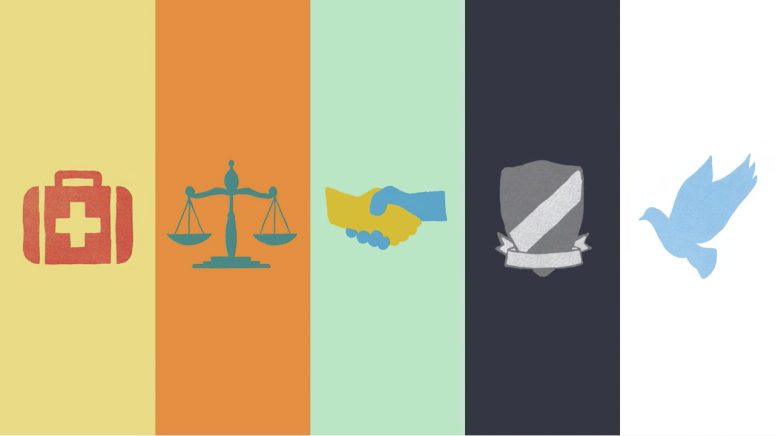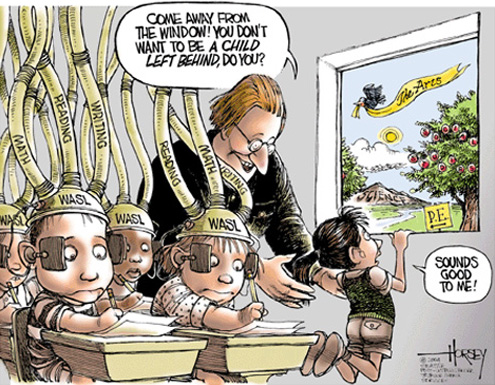
Courtesy Shutterstock
I recently watched two documentaries that left me shrugging.
The first was a an hour-long report on the lack of truck drivers. Basically the filmmakers openly wondered about how to correct the truck driver shortage. They never acknowledged that everyone’s packages are still being delivered. And they offered no answers to the proposed problem, even the dead-simple one that capitalism is really good at solving (i.e. paying more) for talent shortages.
“This isn’t my and/or society’s problem,” I remarked to my wife afterwards. It’s Amazon’s, Walmart’s, and anyone else who heavily depends on shipping. Let them figure it out. With trillions of dollars at stake, they’re highly motivated to do so. No need to worry. Next!
The second documentary openly wondered about what to do about rising temperatures at our Southern Border, which are sadly killing a growing number of immigrants. While I appreciate the documentary’s concern, the filmmakers implied this was society’s problem to fix. And not by reversing climate change, mind you. Rather, the government should do something to help migrants withstand hotter temperatures as they sneak into America, the documentary asserted.
This too, left me shrugging. Maybe just put up signs warning people who exercise free will of the heightened temperature risks and call it a day? Or trust that migrants will increasingly make the attempt during cooler winter temperatures. They have brains too, ya know.
I don’t mean to be insensitive, but the level of distrust for the systems that are actually making the world a better place surprise me.
The world is getting better. Maybe not as fast as you like, but it’s getting better. And there’s no evidence to suggest that trusting in the system actually hinders progress.
You can have both trust and progress. The two aren’t mutually exclusive. In fact, humans are very good at building systems of trust that work more than they fail… while making progress. Trust in that.
Next!

The majority of presidential elections in my lifetime have been determined by little more than 1% of the total vote (roughly 50/50). Regardless of who wins, I always hear the same thing: “The other half of the country is stupid and doesn’t get it.” Which is a stupid, ignorant thing to say.
That’s because when someone disagrees with how you want to govern others, what they’re really doing is valuing different things, regardless if they live in a big city or rural community.
More specifically, researchers have found that humans universally value the following five morals: harm, fairness, loyalty, traditionally authority, and purity. Liberals largely value only harm and fairness. Conservatives value all five about equally in the middle. Libertarians value all five equally, albeit on low levels of all five.
Those values determine whether you’re a liberal, conservative, or libertarian—all of which are inaccurate labels, by the way. Liberals should really be called “People who only care about harm and fairness,” but admittedly that doesn’t roll off the tongue. Conservatives really should be called “People who are slow to change because they want want to value it all,” and libertarians are “You’re on your own, whether you’re a winner or loser in this unfair world.”
It’s interesting to note how values change over time. For example, a liberal living in the ’80s wouldn’t have thought twice about where his tomato was grown or what diet the piece of beef sitting in front of him was raised on. Nowadays, “food purity” is a huge deal to liberals, almost as much as “sexual purity” is to conservatives, even as the latter is increasingly open and accepting of homosexuals.
The truth of politics, according to philosopher Jonathan Haidt, is that liberals and conservatives aren’t right or wrong. Like yin and yang, night and day, or how each of use can be either financially liberal or conservative at times, these ideologies can and should both work together to preserve the good parts of society while improving deficient areas.
Easier said than done, of course. But as Haidt argues, the sooner we accept moral humility, the sooner we can abandon our own self-righteousness about the human condition. When that happens, we can organize, order, and improve society even more.
 American politics are a turn off. So I don’t watch 24 hour news. But American politics are also important. Which is why I read candidate bios before casting my vote.
American politics are a turn off. So I don’t watch 24 hour news. But American politics are also important. Which is why I read candidate bios before casting my vote.
As an unaffiliated, independent, business-owning voter living in a conservative state, I typically vote 60% Republican and 40% Democrat in local, state, and federal elections.
To give you an idea of my presidential voting record, I didn’t vote in the 2000 election while living abroad and I didn’t vote in 2004, because I didn’t like either candidate.
President Obama was the first president I actually voted for. He did a good job, but since I like fresh blood and am pro business, I voted Romney in my next election, followed by Clinton as the lesser of two evils last time, and Jo Jorgensen this time (i.e. a vote for good is better than the lesser of two evils). So two no votes, two votes for democrats, one vote for republican, and one vote for libertarian at the federal level. My local and state election record skews slightly more Republican.
As the last fiscally conservative president that actually balanced the federal budget, I think Bill Clinton is the best president of my life time so far. I liked Reagan’s personality, but in hindsight I disliked his turning the former “conservative” party into a big spending, liberal one (i.e. I only like liberal parties so long as there is a conservative party to keep it in check, and vice versa). I didn’t have a strong opinion on the first President Bush. I thought the second President Bush was a well-meaning man surrounding by poor advisers, and I disliked his war on terror.
I like President Obama’s optimism and moderate approach to the presidency, but I disagreed with his signature policy of insuring people rather than improving their actual health. I liked that President Trump has saved me on taxes and how he renegotiated several international treaties. But I dislike his wall approach, his insulting attacks on people he disagrees with, and his total lack of diplomacy. I don’t believe a vote for Trump is a vote for a racist dictator that will ruin the world. But I don’t feel comfortable voting for him either.
As a federalist, I support the electoral college, even at the expense of the popular vote sometimes. I believe in checks and balances and would hate for any party to control both the presidency and both houses of congress. And I think ranked choice voting is the best way to improve the quality of politicians we elect.
Here’s where I stand on the biggest issues put forth by the country’s two largest parties: The Democrats and The Republicans: Continue reading…

This is an amazing story on how Germany uses detectives to root out lying “refugees” from the ones who really mean well:
“What [the program] has achieved, beyond doubt, is a more limited political goal: to begin to assure Germans that their government’s refugee policy is not simply the absence of a policy. One perplexing question for liberals worldwide is why conservatives seem not to care about the data suggesting that over time, refugees improve the countries that receive them. For one, they can relieve demographic pressures. (Japan’s population is aging, and because immigration remains low, the development of geriatric-helper robots is a national concern.) And refugees tend to be enterprising. “Consider how much courage and determination it takes to put your 2-year-old daughter on your back, grab your 4-year-old son by the hand, and start walking toward Europe,” James Stavridis, who was the supreme commander of nato from 2009 to 2013, told me. “I want that person on my team.”
Continue reading…

Les Films du Losange
Four disturbing but important stars out of five. My wife and I enjoyed, pondered, and discussed it very much.

Seinfeld
In a market economy, I believe state run economic development can sometimes be a good thing. But I suspect it’s usually a bad thing. Here’s why, in which a Rhode Island state treasurer cautioned against backing a celebrity owned company that would ultimately become a $75 million bath for taxpayers:
“In general, I would proceed very carefully on this. [The company] is in the Boston area where there are 200 venture capital firms, and it is in a very hot area of gaming so if it were in fact a compelling investment I would have to think it would be well funded already by venture capitalist; the fact that many have looked at it and passed is a red flag.” Continue reading…
[youtube]http://www.youtube.com/watch?v=9D05ej8u-gU[/youtube]
Not only that, but it makes me want to roast marshmellows around a fire and sing Cumbauya with believers and non-believers alike. Either way, I like watching Neil Tyson on PBS Nova. But I really like him after hearing this wonderful answer put to music and film.
That said, I still think modern NASA is a dinosaur. It’s the equivalent of thinking the Internet still needs a government agency like ARPANET to perpetuate great things.
It doesn’t, although I believe in NASA, ARPANET and similar “start up” public technologies to get the ball rolling, since the private sector would likely never incur the initial hard costs to get these kinds of things going.
So thanks government. But please step aside once you’ve paved the way — we’ll take it from here. (That last line basically sums up most of my political thinking).
My heart sank when I read the print edition of this story yesterday. In short, $360 million of U.S. taxpayer money, intended to fund the military, was outsourced to Middle East criminals, terrorists, and even the Taliban, the very organization that money aimed to disrupt.
Here’s how I processed the news.
- I’m thankful to live in a country with a free press and democratic government willing to share such corrupt news. Neither are perfect, but reports like this are proof that there is still good in the world; good enough to let this kind of stuff come to light.
- $360 million is a fraction of total defense spending, and thankfully, as far as we know, much of it still falls in the right hands. Unfortunately, 1/3 of a billion is an incredible amount of money for criminals and mountain-dwelling terrorists intent on building bombs and blowing things up. It’s inexcusable.
- Why can’t the U.S. military enlist cooks, truck drivers, security convoys— virtual everything— from within? You know, like the good ole days, when soldiers worked in mess halls etc. Stop outsourcing our military, and we’ll minimize said corruption.
- Stop awarding closed defense contracts or open contracts to non-U.S. suppliers. What advantage does this bring? I understand President Obama awards contracts to Afghan companies in an effort to stabilize their economy. But is that the purpose of defense spending? Shouldn’t it be defense, not economic development? It’s counterproductive.
- Can we pull out of Afghanistan and Iraq already, Vietnam style? Just do it. I know there are cronies in those countries who don’t want the sugar daddy to leave, but it is high time. Then reinvest half of the savings into intelligence operations to thwart and outsmart terrorism as best we can, as opposed to occupying nations.
Did I miss anything?
 See.
See.
Via The Atlantic:
If The Federal Government’s household income was $55,000 per year, they’d actually be spending $96,500–$41,500 more than they made! That means they’re spending 175% of their annual income! So, in 2011 they’d add $41,500 of debt to their current credit card debt of $366,000!
Yup, it’s as bad as you thought.
Would be interesting to see what Rome’s debt-to-income ratio looked like before they fell.

Among other things, I’ve been working as a media consultant for the state of Utah this year — specifically related to Utah Lake. To help promote the lake as a tax-funded and public resource, I helped officials launch and now maintain a new editorialized website at utahlake.gov (pictured).
Local media, however, isn’t a fan — at least not yet — and rightfully criticized the site’s birth warts. “Government officials have launched a website aimed at helping locals stay home to vacation on Utah Lake, but the launch hit rough waters,” wrote Caleb Warnock, reporting for the Daily Herald. “On Wednesday, repeated attempts to find recreation information were greeted with this message: ‘The page you were looking for could not be found.'”
Not only did the site launch with broken links, there were a few proofreading errors too, not to mention editing notes that were never meant to be made public.
Kind of embarrassing. Continue reading…
This is a great essay by Michael Laser on the importance of opposing political viewpoints:
To my amazement, I’ve found that some of my political opposites’ ideas make sense. This doesn’t mean I’ve reversed my thinking, but it’s eye- opening. If you shut out the noise of talk radio and your own unshakable faith, you can find persuasive arguments on both sides of the divide. Here are a few that I came up with:
He then goes on to objectively list seven opposing viewpoints, before concluding with, “Contempt for the opposition may be profitable on talk radio, but it doesn’t help the rest of us. All it accomplishes is to drive people further into their angry, fanatical corners.”
Long live political checks and balances!

I read Nineteen Eighty-Four this month for the first time. What struck me most about the book was not George Orwell’s impracticable vision of totalitarianism. (On the contrary, there are “less arduous and wasteful ways” of satisfying a government’s lust for power.) Rather, it’s how overwhelming the antagonist is. For example, consider this “you can’t stop us” speech given by Comrade O’brien, as he tortures our anti-hero Winston into submission: Continue reading…
 I often use vark.com to impatiently satisfy the many questions in my head. At least the ones I’m too lazy to Google myself. Yesterday’s question was as follows:
I often use vark.com to impatiently satisfy the many questions in my head. At least the ones I’m too lazy to Google myself. Yesterday’s question was as follows:
Are there historical examples of modern democracies successfully reducing the size of their governments, either on a federal, state, or local level?
One guy named New Zealand and “a few Scandinavian countries” without further explanation. Brendan from New York replied:
There are examples of US states that have done it (I think Connecticut trimmed down successfully during the 90s). Also, and this is crucial, there are examples of countries that successfully ensured that the size of government did not grow once all necessary services were in order. Canada is a prime example. It has a sizable government, but it has been excellent at maintaining its size while the Canada population has grown. Its government isn’t bleeding like a lot of European countries are. The key for any government’s solvency is to maintain high revenues. Consider Greece, where $18 Billion in tax revenue went uncollected due to tax evasion. That means that Greece spent $145 Billion, collected $108, and could have collected a crucial $18 B more. If a country can’t effectively collect taxes owed, it’s finished.
So you’re telling me there’s a chance?
Dear Coke,
I would pay a premium for your drink, if you reinstated sugar instead of using that artificial sludge and government subsidized sweetener you call corn syrup. In fact, I do. Paying almost twice as much for imported Coke from Mexico at nearby convenience stores, because it contains delicious sugar. Mmmm, real sugar.
You see, as a result of your chemical sweetener ways, your domestic concoction burns the throat. It’s like mild acid, in fact. And it has a pronounced after taste. Mexican Coke, on the other hand, goes down smooth. It tastes better. It has no after taste. Not to mention the glass bottle looks cooler.
Continue reading…

In case you haven’t noticed, I’ve been pretty cynical about the great economic apocalypse of 2009 and our federal government’s questionable ways of dealing with it. Armed with a degree in business, I like to think I have all the economic answers, but I don’t.
Though I strongly disagree with frivolous spending, especially the kind that doesn’t create actual jobs, I’m not blind to the fact that it’s been going on for centuries. Hopefully good legislation will prevail again, and the people in power will make smart decisions and adjustments to support entrepreneurs.
So rather than complain and point fingers, I hope to contribute, starting with a sensible and positive outlook. Viva, la revolución!

Associated Press
… The world financial markets fall more than they would have, because financial markets are based entirely on confidence. And when you have intimidating officials like President Bush and McBama spreading FUD like, “the worst economic crisis since the great depression,” fickle investors will believe them, and global bank markets struggle.
I’m not saying there wasn’t a partial bomb to begin with — there was thanks to a greedy and irresponsible Wall Street — but that still doesn’t mean top officials can frighten the public with said statements just to bail out their Wall Street buddies who donated lots of money for special interest (which they succeeded in getting this time). Just like yelling “Bomb!” in an airport is illegal, so should it be for individuals in power crying “depression” just to get their way.
Continue reading…
 Here’s how, in three painless steps:
Here’s how, in three painless steps:
- Search your elected officials here using your zip code
- Select “president and congress officials.” For today, click on all representatives and email them under the contact tab (Utah residents should email Rep. Cannon at cannon.ut03@mail.house.gov)
- Paste the following email using “Vote ‘against’ the revised $700 billion Wall Street bailout” as the subject.
Rep. [last name]
On behalf of friends, family, and my influence as a local blogger, please vote against the revised $700 Wall Street bailout this Friday (Oct 3).
Thank you,
[You name]
[city, state]
The whole process from start to finish will only require a minute of your time, but you must act today! Isn’t saving the dollar easy?
I fear for the future value of my hard-earned dollar. I no longer trust the federal government with spending, nor do countries abroad. When that happens en masse, the dollar will crash.
Sadly, that’s the price we pay for electing big-government knuckleheads into office, and for letting the Federal Reserve buy 80 percent of AIG for $95 billion without a vote, even though U.S. taxpayers will have to pick up the tab.
Man, is our federal government broken (I trust state government so much more right now). When will they understand that “this insanity and the problems we face economically will only occur when we allow the economy to find its own equilibrium. We have to allow the market to endure a recession, we have to allow failure.” — Joe M.
For the sake of our country, at the least to make a statement, write in Ron Paul for president this November. It appears McBama will only continue the trend of frivolous spending and federal intervention.
See also:
AUTHOR’S NOTE: If you don’t want to challenge your optimistic beliefs on the U.S. War in Iraq, or are offended by patriotic criticism, please skip this post.

AP Photo File
Upon researching the ancient, now-ruined city of Babylon, I discovered that its remains lie 55 miles south of Baghdad. The nearest modern-day city is named Al Hillah and “was the scene of relatively heavy fighting in the 2003 U.S. invasion of Iraq,” according to Wikipedia.
Given what we’ve known since 2005, I was embarrassed to read that last line, “in the 2003 U.S. invasion of Iraq.” It’s still difficult for me to consider that the United States invaded anyone, much less Iraq on false, reportedly fabricated premises.
Continue reading…
The United States is nearing bankruptcy, and yet officials want to borrow more money (!) to curb economic woes, according to today’s headlines. It’s amazing how fiscally incompetent these knuckleheads have become — they’ve all but defecated on our once precious dollar.
As harsh as it sounds, natural consequences (i.e. bankruptcy, foreclosures, loss of jobs) is the only way to atone for our country’s overly optimistic and unchecked enthusiasm of recent years. This includes irresponsible land developers, loan officers, politicians, investment bankers, and home owners who bit off more than they could chew — all of whom ignored the basic principles of supply and demand.
Dude, where’s my country? I feel like I’m taking crazy pills.
See also:
According to the Associated Press, “The French state and Internet service providers have struck a deal to block sites carrying child pornography or content linked to terrorism or racial hatred, Interior Minister Michel Alliot-Marie announced Tuesday.”
I’m all for outlawing illegal communications like child pornography and terrorism, but hate speech isn’t illegal. Wrong, yes, but not illegal. Unless I’m missing something, it looks like France may have infringed on free speech, though I have no idea if they have an equivalent first amendment.



 American politics are a turn off. So I don’t watch 24 hour news. But American politics are also important. Which is why I read candidate bios before casting my vote.
American politics are a turn off. So I don’t watch 24 hour news. But American politics are also important. Which is why I read candidate bios before casting my vote.





 I often use
I often use 

 Here’s how, in three painless steps:
Here’s how, in three painless steps: